Okay. I am Chief Christopher Ayogu. Knight of Saint Paul, KSP. I was born December 24, 1947, in this Okpuje [in present-day Enugu State].
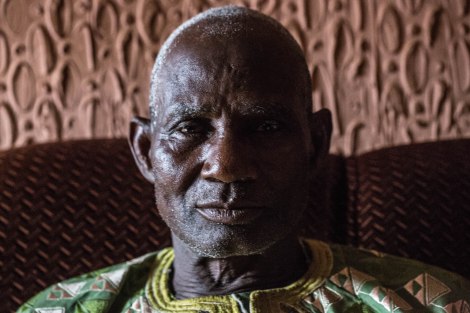
Christopher Ayogu shares his Nigerian-Biafran War Memories. Photo by Chika Oduah. 2018.
This Okpuje Ani village, in Okpuje town.
Our people were being killed in the North
I was at home here [when the Igbo pogrom began in the North before the war began]. I was at home here. But eh, our people were being killed in the North: Kaduna, Kano, many places of the North and that prompted the military, Igbo military men in the North were directed to go come back to the East.
Here I was a petty trader then. I was a petty trader. Just- I finished my primary education. You know here, we are, now as we are developing, so, they don’t value education. So, they just gave me few amount and I started petty business, provision in the market there. That is what I was doing when the war started. So, as our people are returning, the military returned, and then, we heard of that name, Emeka Odumegwu Ojukwu.
Many [I saw coming here from the North].
Hey! [in a sad voice]
…as far as you are an Igbo man, they will kill you
I talked to them and they told us, even this Samuel who I will call now, so, they told us that, eh, the Northerners, the Hausas because they thought that the Igbo man who is the military head of state, Aguiyi Ironsi, was an Igbo man, and they planned a coup that killed Ahmadu Bello from the North, Sardauna, the Ahmadu Bello of Sokoto and then Tafawa Balewa, the prime minister then.
…the North felt that it is a coup planned by the East
They killed two of them, core north. So they felt that- and they didn’t kill the governor of Eastern region which is Michael Okpara and the governor then, which is Akanu Ibiam. So the North felt that it is a coup planned by the East and then, after the coup, they now made an Igbo man the head of state which is Aguiyi Ironsi. So because of that, it became an enmity. So they started killing the Igbos without even- traders, soldiers, policemen, civil servants, as far as you are an Igbo man, they will kill you. And then, the people started hiding in army barracks, police barracks. That is what they told us. Sometimes they will still go to the barracks and select some officers of Igbo origin and go and slaughter them.
I don’t have a direct relations [with those who fled the North] but many from our community returned. Some soldiers, some civilians, some policemen, many of them.
Civilians who don’t know anything about what is happening were just being murdered
Their experience is too many. Someone told me that his friend, a Hausa man, his friend, laid a group to his house. The only luck he had is that he went out through the outer door like this before they come in and then that his friend asked of him, that if they had met him, he would have make sure that they kill him because he has come to collect some properties which he had been seeing in his house as a friend. So, that is what is happening there. They also said as many of them are returning in trailers, sometimes they will meet a road block and then some people will be selected down and killed.
…kill a pregnant woman, bring out the child inside her womb…
So, and so on and so forth. Civilians who don’t know anything about what is happening were just being murdered. Sometimes they’ll kill a pregnant woman, bring out the child inside her womb and put it on top of him.
…we’re always our brother’s keeper
They are half naked. They didn’t return with anything. We started harboring them because, we, the Igbos we are always our brother’s keeper. We feel about our extended relations. So, we have to rehabili– even when you’re talking North, even Kogi State here, we have boundary with eh, with eh, North here, just about eh, seven kilometers from here, you get Kogi State. They also answer, they’re answering North. Our people who are farmers there, the people of Igala refused that they will not harvest their yam and go. They returned empty-handed. Even one of my brother, the younger brother to my father, returned empty handed. My father now gave him yam and he started cultivating and feeding his three wives and children before he will stabilize. So, so that even the people who are relating with here as neighbors turned against us because they call themselves North and they want to ravage our properties, our food, everything that we have in their land. Whether you are quarreling with them or not, as long as you are from the Igbo land, so they took it as free-for-all fight. So that collecting the properties of the Igbo man will make them whatever they want to be but they didn’t know that destiny is different.
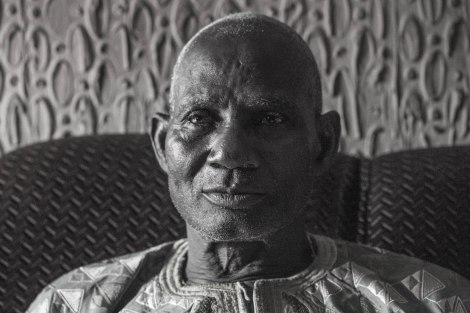
Christopher Ayogu. Photo by Chika Oduah. 2018.
Okay. During the war or before the war, as the war was raging when they now pronounced Biafra- Ojukwu pronounced Biafra, I think sometime 1967, early 1967, then, some of us wanted to enter the army but it’s not possible for us. I didn’t enter immediately. At a stage, the war came from that Kogi State, from the border to Okutu. Okutu is the next town from Okpuje. Then, from Okutu, they entered Okpuje. So, all of us packed to the farm. We are in the farm. We sleep on the bare grass. Some of us in the morning you will see snakes which have died, which we used our body to kill. So, God is God! Snake which bites people always but in the morning, you will see a big snake which you put your mat on the grass and sleep on the snake and it will die.
I didn’t sleep myself but I saw people who slept on a snake and snake didn’t, in the morning.
How many times now [I had to sleep in the bushes]. For many months! We climbed hill and run. During the war, during the war.
We didn’t know Biafran army have slipped behind the bush and gone back
Hey! Many times [I heard gunshots]. Before we go to Nsukka, we have been hearing the sound [gunshots] here. That time the Biafran soldiers will come from Nsukka, they go and fight and then, they will run. They will withdraw and run but we didn’t know that they withdrew. Some of us will go to the market to go and hail them. We thought we are hailing the Biafran army. We didn’t know Biafran army have slipped behind the bush and gone back to Nsukka and the soldiers from the North are coming, coming. I was in the market with some people. We see armored car. We didn’t know what is called armored car.
But, we see that tank moving and soldiers following both sides. They face the bush this way and shoot kwa, kwa kwa, kwa, kwa, kwa, kwa! They will face this way, they shoot. That time armored car going round shooting in the bush, shooting in the bush. Then, sometimes they saw that some of us are in the market, then, armored car threw some bullets, it carried the sand and eh- hey! I told the people there ‘if these people are the Biafran soldiers they are now mad. Let us run away.’ Few of us ran home. Few, some who are argumentators stayed back and all of them died, about 13 of them were killed there. That is when they crossed this community and then, before you reach this community you will see an open virgin land. That is where they camped. They camped there for more than three months.
Eh heh, the Nigerian army, they camped there. That bush there. For more than three months waiting for reinforcement because the Biafran army killed them many on the road here. Many of them died. So, as they are there they killed many of our people because they are not violent. They will hide in the bush. You will not know that they’re there. When you now want to go to Ibagwa-ani [a nearby locality], somebody will just come, carry you inside and kill you. That is how many of our people died.
Even my own father said that when the war is on, people who are not participating in it – civilians – will carry food to the soldiers. So, they cooked some yam, potato, rice and then about 15 or 16 of them carried it. They carried palm- palm leaves, the yellow one- omu in Igbo land – and tied their head. When you tie it, it seems you’re a member of the Red Cross. That is what it entails. So, they tied it.
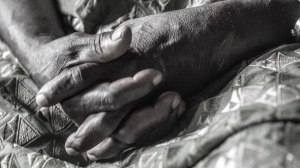
Christopher Ayogu’s hands. Photo by Chika Oduah. 2018.
Yes. Yes. They carried the food to the people where they are, they are, they are, they used to be their headquarter, one hospital up there. So, when they reached, the soldiers came out say why are you here. They said they bring food for the people who are here because they know you are not a carrying food. They say who did you bring the food for? They don’t know. This time they have now seen that they’re not Biafran soldiers. They said we don’t know. What we know is that people are in our farm and we know they will be hungry. We are bringing food to them. So, they go and bring their- said they have plenty food which they will eat. OK. Put your food down. They put am down. They say eat it. They started eating the food- to know that there is no poison inside the food. After eating the food. They pitied them.
Yes, [I wanted to join the Biafran army]. Once, 1969, when it became very hot here. That time, in the afternoon, the Nigerian army, they are living in the market. Every area of this road. They live at Okutu [a nearby locality]. They live at Okpuje. They live at Ibagwa-ani. They live at Arungo [a nearby locality], up to town. So, in the afternoon, they will be walking ’round here. In the night, the Biafran army called BUFF, BUFF, [the actual term he is referring to here is BAF, which stands for Biafran Armed Forces].
Eh heh, they will come in the night. If they hear that in the afternoon that you are mingling with the army, Nigerian army, they will come and carry you and kill you. So, by that time, we young men, that time I’m young.
So, and that is that. At that situation, some of us were in danger. Many of our boys were killed by the army. When the Nigerian army hear that the BUFF came in the night and they associated with you, they come and kill you. When the BUFF come in the night, they hear that you associated with Nigerian army, they will kill you. So, few of us, about nine of us, started moving. We went to Ukehe [a nearby locality].
War is a dangerous phenomenon
So, we went there, that is where the Biafran army are camping that time. So, went there. We want to be recruited into militia. So, we stayed there for one week. They did not recruit us. Then, the Nigerian army now came and captured Ukehe. We went into the bush again. So, from there we travelled in the bush for three days till we come back to this place. So, that is my attempt to enter the army. So, I didn’t join again because where they put us, they say the people in training when they are released, they’ll carry us to training. But before the people in training will finish, for us to enter the training, the army have captured eh, Ukehe and scattered eh, everywhere. So, we went into the bush and came back. As we came back, that is how our lives continued to be in the bush. Sometimes, the Nigerian army will come to the farm where we run to. They say we have known here. You left us here. We are isolated. All of you must come home. Okay. We returned home. We came- that time, my father’s house, that is where I’m living. We came home. So, they visit us. They visit. They say we should be coming to market. Oh, we go to market just to mingle with them. That is what we are doing.
Men die because malnutrition
Throughout [the war, I stayed here except rom that time I ran into bush]. No, no, none of my siblings [died].
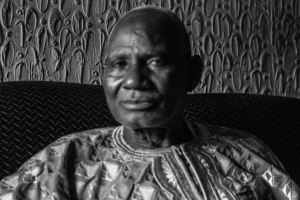
Christopher Ayogu shares his Nigerian-Biafran War Memories. Photo by Chika Oduah. 2018.
Ah! That one [starvation] is sure now. Many died of starvation especially those who are weak.
The soup is just like water
Eh, there’s one of our brother here called Muzai. He’s my age mate. He died of hunger. He died of hunger. Many died of hunger. Children die. Women die. Men die because malnutrition. You don’t see any other thing except you eat cassava, you eat yam. There’s nothing like rice. There is nothing like cray fish. Those things which we get from Onitsha, you don’t see them. You don’t see them. So, the soup is just like water. You bring okra from your farm, you bring melon from your yam. You seal it, put it to the soup, except if you are lucky, you catch meat, you use it to make soup. That is the only ingredient. [Chuckles]
So, malnutrition, even if you see something to eat, you’ll be eating one food, morning, afternoon, night, just one food. No! So that is…[voice trails off]
Eh, the war. War is a dangerous phenomenon. War is not good for human beings.
Hey! You see what I told you? That there is a period which is what I called the peak period for us there. When in the night, you’ll be running away from the Biafran army, BUFF [the actual term he is referring to here is BAF, which stands for Biafran Armed Forces]. In the afternoon, you will be running away from the [Nigerian] army.
You see, don’t you see my hand now? That time, you will be working very hard so that when the Nigerian army see you, they say ‘you’re Ojukwu soldier!’
You say, ‘don’t you see I am a farmer?’
So your hand will be scratched to show that you are a farmer. The whole of your body will be tattered to show that you are a farmer.
…they rape our women…many!
Yes! Yes! Yes! [My hands were scratched]. You work hard. Make yourself dirty to show the Nigerian army that you are a farmer. That you are not Ojukwu soldier. As long as you are a young man, all young men, they term you Ojukwu soldier. And they kill at, at, at will.
Our women, our women, they rape our women. Hey! Many!
In the market place, at that farm. They will come, about 10 of them, surround the market, because we have a mini market where we carry cassava and sell. You can sell a basket of cassava 3 kobo. You use it to buy whatever you see there. They surround the market. They take the women, just about one quarter of a pole, they rape the person, they return the person to the market. They take- nobody goes out of the market. They did it for several times. You have no alternative. You will be here, they come and carry your wife. They will be living with your wife in the market while you are here. You can’t talk. If you talk, they will kill you. So, that is what we saw. We saw it. That time, I have not married. I married after the war.
Philip Effiong have surrendered.
That day [Biafra surrendered], I was in the farm, in the barn, where we are tying yam. When the Nigerian army came, usually they come there and say give us yam, I say ‘take as much as you can carry.’ They will take. So, they just came that January. It’s January. I don’t know the date. But, it is on a January 1970. They met us. They say ‘did you know that the war is over?’ I say ‘I don’t know. How do I know? I don’t get radio. I don’t get anything.’ They say ‘the war is over. Biafra have surrendered. Philip Effiong have surrendered.’
Heh.
I say ‘ok.’
Said ‘don’t fear again. We are going. We are going. We don’t want to take your yam again. We don’t want to molest you again. We are now one.’
They’ll embrace us.
…my own direct siblings are small, na. They’re small. They’re not to the age of going to the army or police that time. They’re very small. But, many of my relations were conscripted into the army. And many of them died in the Biafran war as Biafra soldier.
…we are at their will
Sometimes, we ran away to another community, Edem [a nearby locality]. When we are at Edem, we stayed there about a month or two. The army will come and capture Edem. Then, we’ll follow the bush and come back. So, that is how it happens. So, we stay at home. We build houses in the bush. That is in the farm. We live there. When the army come there, they say you should come home. We come home. We just obey them because we are at their will. Whatever they like they do because they are armed. Thickly armed.
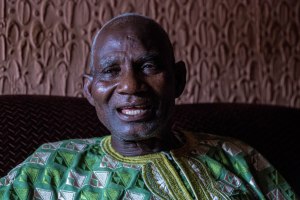
Christopher Ayogu. Photo by Chika Oduah. 2018.
[When they told us that the war was over] we didn’t take it serious. We thought they are playing with us. Until, until we see that actually the war is ended and we’re happy. We’re happy.
My father is a farmer. My mother is a farmer. Eh heh, they survived. My father died 1988. My mother is still there, up ’til now.
No, we don’t have bunkers here, oh! [for protection during the air raids] But, the helicopter bombed many places. Bombed many places here.
Amafor. Amafor [a town in present-day Enugu State]. There’s one upstair. Old upstair [an old multi-story building], they bombed it.
…let us go and hide inside trees and bananas
Though it is the Biafran helicopter, not the Nigerian helicopter that bombed the place. They thought that the Northerner-Nigerian army are hiding there.
When the Nigerian army came with their jets, the Biafran people have taught us, immediately we hear about jets, let us go and hide inside trees and bananas. So that, it will not, eh, they will not see us. So, that is what we do. Immediately we hear the sound of plane, everybody will run into the bush and hide where there is no house. Because they will always see houses and it is houses that they burn- they bomb.
They, they, they [Biafran soldiers] come here, they come here before the war started. Before the war started.
I just dey crawl
They tell us ‘if you hear, eh, this mortar, or shooting, make you enter under the table. If they are bombing, enter your bed so that wall will fall on the bed and it will not kill you. That is what they taught us.
Mmm hmmm, so they sensitized us very well. Then, if you are in the bush, don’t get up running, be crawling catching the grass. Then, you will be running. That is how I run, ran from the market that day. I just dey crawl, dey crawl until I was, from the market. About two or three poles, I crawled.
That is about, eh, a pole is about, eh, four poles is about one mile or, yes.
Crawling, crawling, in the bush. By myself, by myself and those who didn’t run that day, all of them died.
All of them died. All of them died and the market was burned down.
Mmmmmm.
It’s a pity.

Christopher Ayogu. Photo by Chika Oduah. 2018.
Christopher Ayogu granted this interview to Chika Oduah from his home in Enugu, Nigeria.
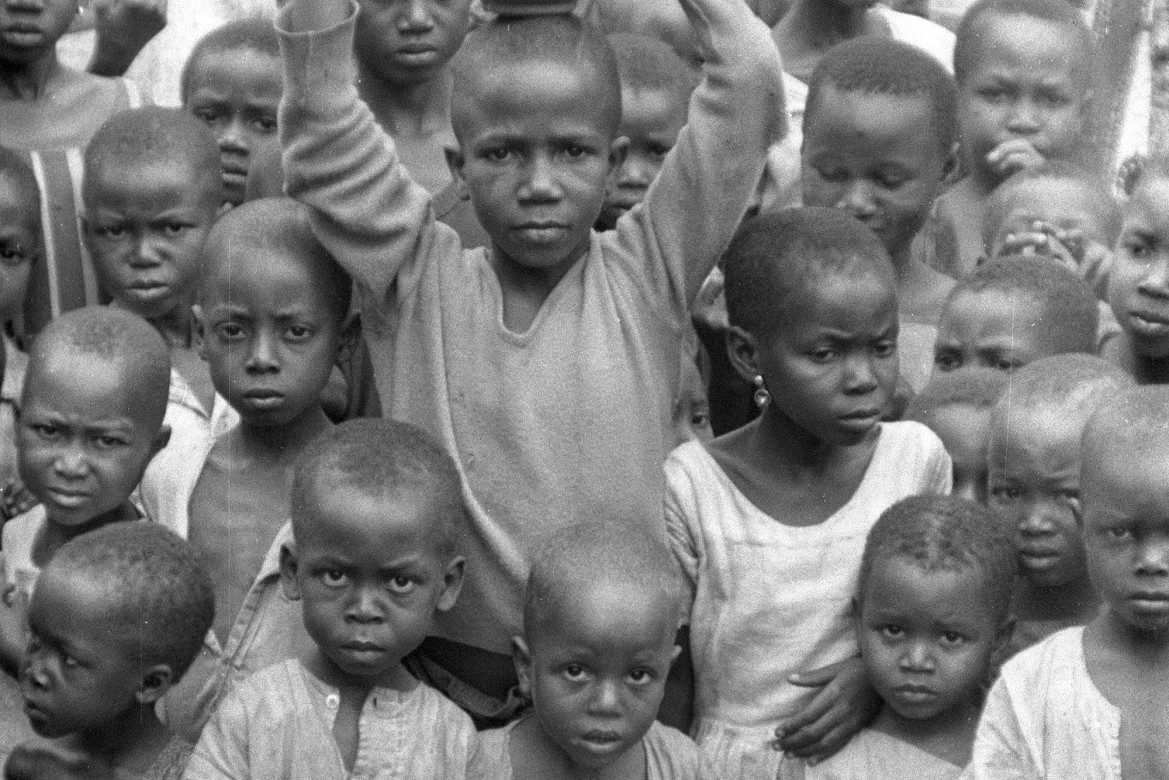
Really want to know the in depth of biafra war. Love what I saw so far. Eyes opener
LikeLike
This is so hard (emotionally) to read, imagine those who hard to live it. It’s no wonder our parents and relatives who lived through it would rather not discuss it.
LikeLike